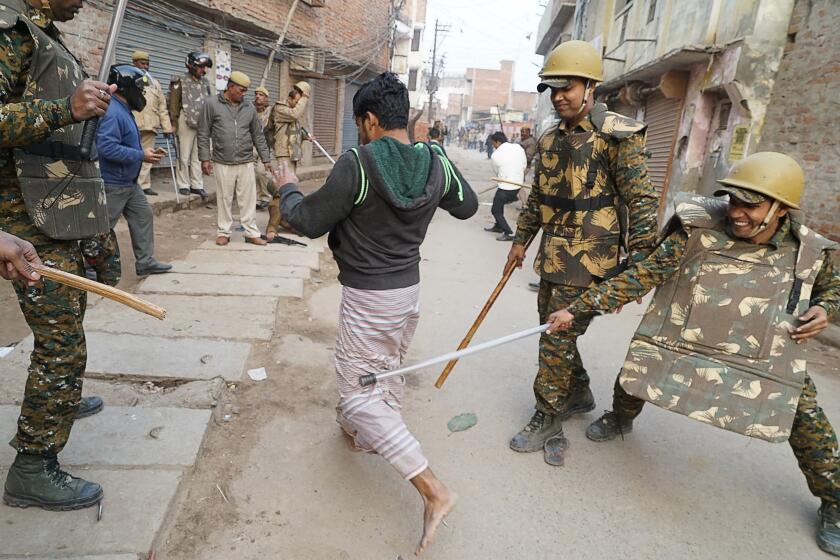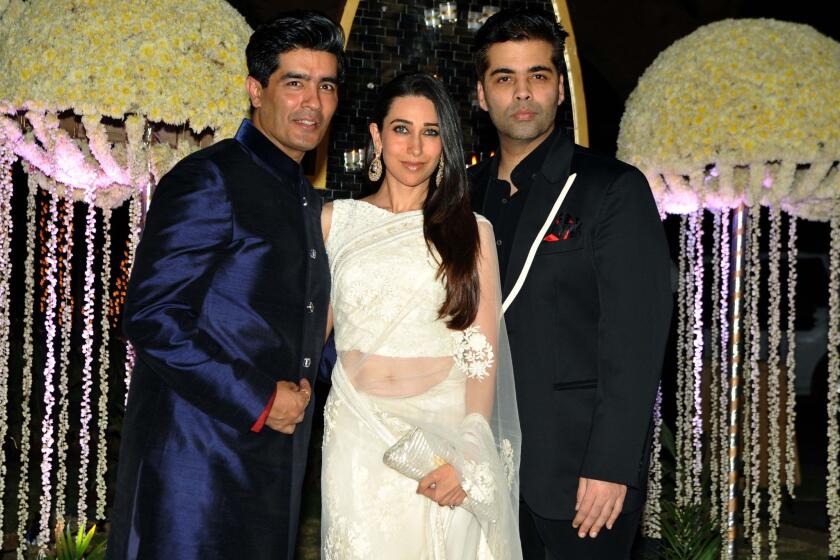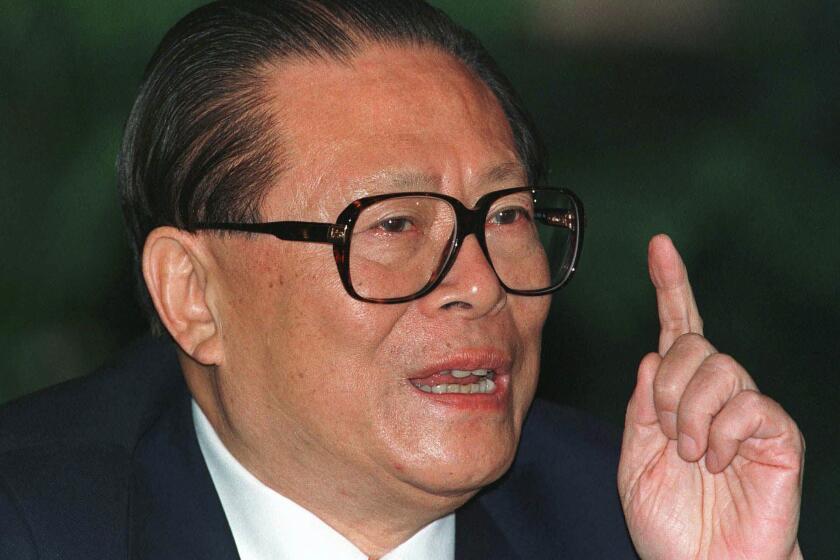The young Indian stand-up who went to jail for a joke he didn’t tell
- Share via
MUMBAI, India — For more than a month, Munawar Faruqui, a tousled-haired, 30-year-old comic, languished in jail for a joke he didn’t tell.
Faruqui was beginning to make his name in the crowded ranks of India’s up-and-coming stand-up comedians. More than half a million people subscribed to his YouTube channel, where his performances feature an edgy mix of social and political commentary, one-liners and takedowns of religious fundamentalism delivered in rapid-fire Hindi.
The trouble started on New Year’s Day, when Faruqui took the microphone at a cafe in the central city of Indore. Just as he was beginning his set, a man wearing a white shirt and unzipped vest walked onstage and began harassing the comedian, accusing him of insulting Hinduism.
The crowd cheered on Faruqui, who is Muslim, and burst into applause when the man left. Minutes later, Faruqui and four other comedians and event organizers were arrested by police for allegedly making “indecent” and “vulgar” remarks.
Denied bail three times by a state court, Faruqui appealed to the country’s Supreme Court, which ordered Friday that he be released from jail pending a trial. Critics say he has become a prominent example of an escalating crackdown against free speech in Prime Minister Narendra Modi’s India.
A growing number of entertainers, activists, lawyers and academics who have spoken against Modi’s Hindu nationalist government have been arrested, charged with sedition and other serious crimes, or viciously attacked on social media.
In recent days, India has filed criminal charges against journalists who covered a Jan. 26 protest by farmers against proposed agricultural laws. It ordered Twitter to block hundreds of accounts critical of the prime minister and threatened the company’s employees with jail time if they didn’t comply. Last month, the producers of a fictional Amazon Prime Video series called “Tandav” apologized after politicians from Modi’s party claimed the show had insulted Hindus.
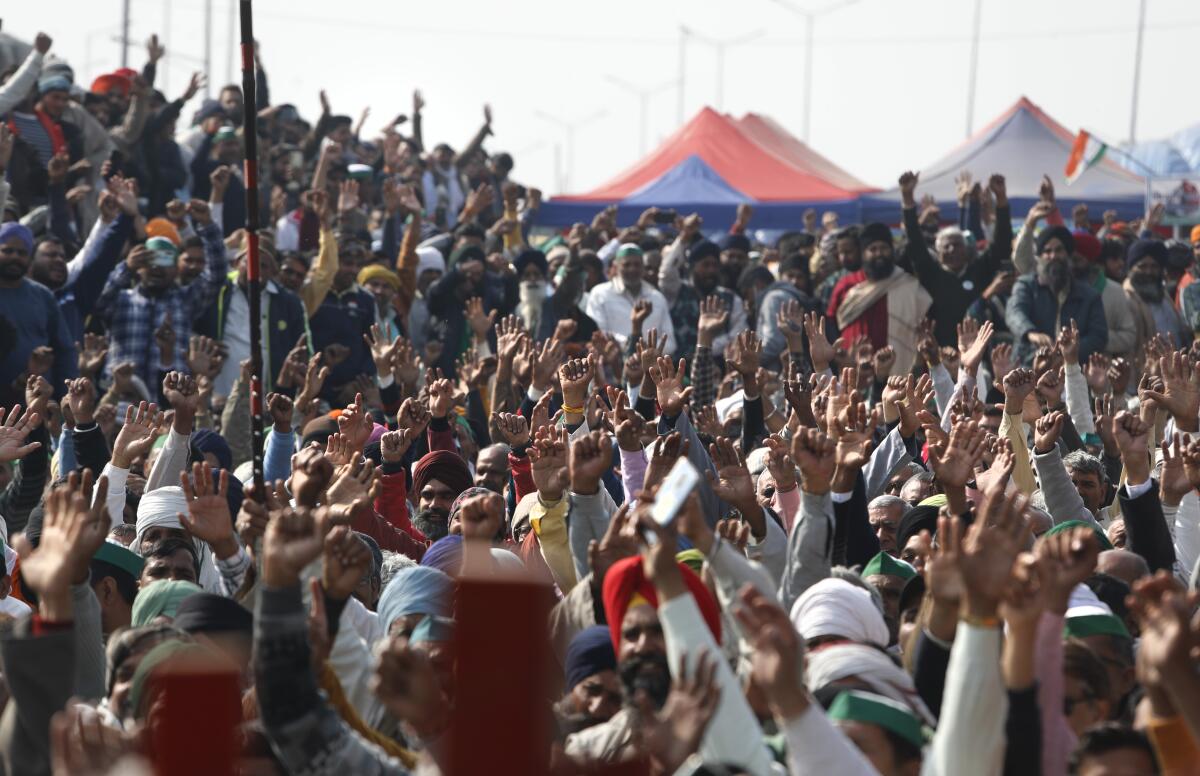
Faruqui’s friends say he was targeted in part because of his faith. The allegations have jeopardized the promising career of a small-town striver whose only offense, they argue, was poking fun at the powerful establishment in a country that increasingly seems to lack a sense of humor.
Muslims, who make up about 14% of the population, are the largest religious minority in overwhelmingly Hindu India. Since Modi came to power in 2014 on a Hindu nationalist wave, members of his Bharatiya Janata Party and allied groups have promoted laws that have marginalized Muslims and subjected many to vigilante violence.
Faruqui’s case shows that in India, the world’s most populous democracy, “the judiciary sometimes looks at the accused, not the accusation,” said Sanjay Hegde, a prominent lawyer who is not involved in the case.
The man who accosted him onstage, Eklavya Gaur, is the son of a local leader associated with the ruling BJP. Gaur is the leader of a group called the Hind Rakshak Sangathan, one of many hard-line Hindu organizations that have risen to prominence under Modi’s government and claim to defend the faith.
It took just one tweet from singer Rihanna about farmer protests in India to anger New Delhi and supporters of Prime Minister Narendra Modi.
A video shot by an audience member shows Gaur addressing the crowd, saying: “This is Munawar Faruqui. He makes fun of our gods and goddesses and you pay to watch his shows. Don’t you have any shame?”
“Sir,” Faruqui responded calmly, “I don’t target anyone. I have made jokes about Islam. I have also made jokes about triple talaq” — a practice, until recently legal in India, by which a Muslim man could divorce his wife merely by uttering (or texting) the word three times.
Gaur said he didn’t care; he accused Faruqui of mocking Ram, a Hindu god, which he found unacceptable. Gaur appeared to be referring to a joke, seen in a clip online, about a classic Bollywood love song in which a woman invokes Ram to celebrate her husband returning home.
Faruqui joked in English: “Ram-ji doesn’t give a — about your husband.”
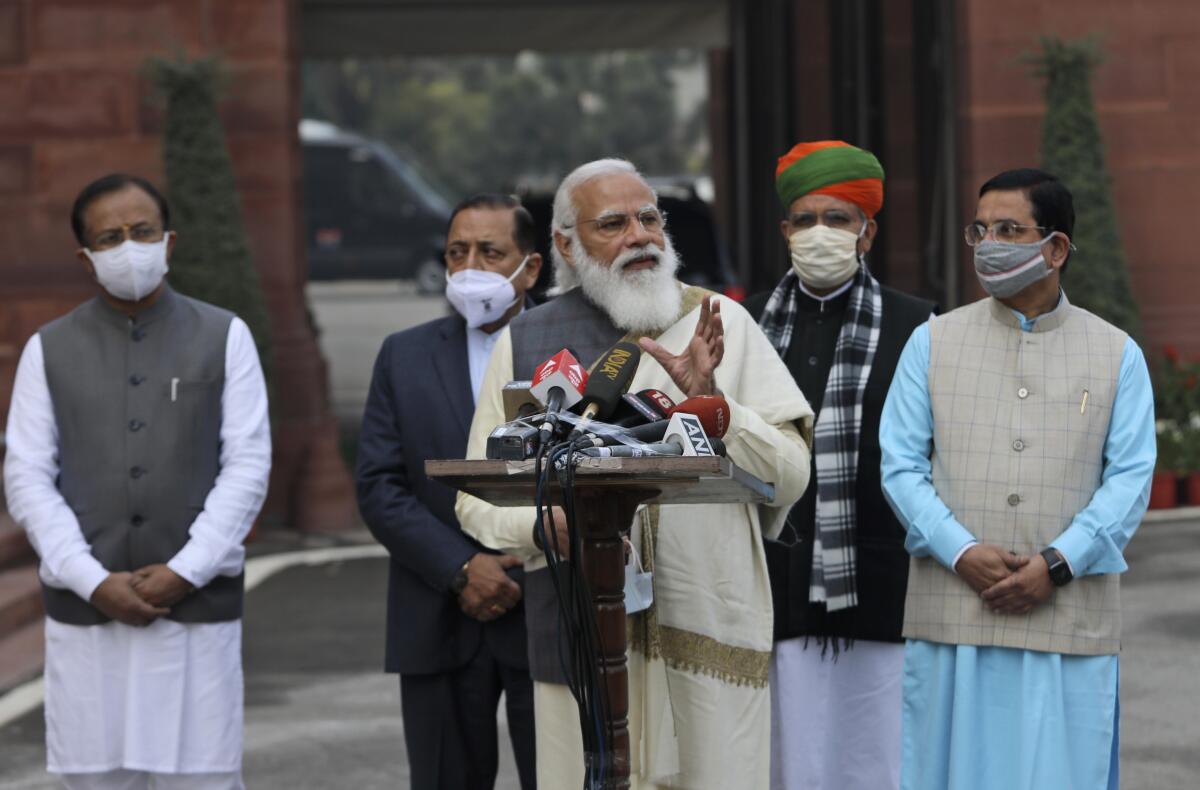
In a complaint filed with Indore police, Gaur accused Faruqui of “deliberately intending to outrage religious feelings,” a criminal offense punishable by up to four years in prison.
Faruqui’s lawyer, Anshuman Srivastava, said Faruqui did not perform that joke in Indore, and that Gaur has alleged only that he “overheard” him practicing the line.
“The police registered the complaint without conducting a preliminary investigation,” Srivastava said. “It appears this is happening under political pressure.”
Charges of religious bias by security forces have blighted Prime Minister Narendra Modi’s credentials as leader of the world’s largest democracy.
With barbed, well-timed punchlines, Faruqui did tread on sensitive topics during his brief time on stage. He opened with a joke about his home state. “I was born and brought up in Gujarat,” he told the crowd. After a pause, he added, “Survived in Gujarat.”
The crowd laughed, but the joke was dark: Gujarat, a prosperous state in western India, was led by Modi for more than a decade before he became prime minister. Under his watch, in 2002, religious riots killed more than 1,000 people, most of them Muslims.
For years, Modi was dogged by allegations that he did not take action to stop the bloodletting. Although he has never been convicted of wrongdoing, the riots remain a blot on the prime minister’s career. Many Muslims in Gujarat continue to associate Modi and the BJP with religious persecution.
“I think I survived,” Faruqui continued, “because I believe [the] government is not good in completing their targets.”
Low whistles this time, then laughter and applause.
A few minutes later, he and the others were arrested.
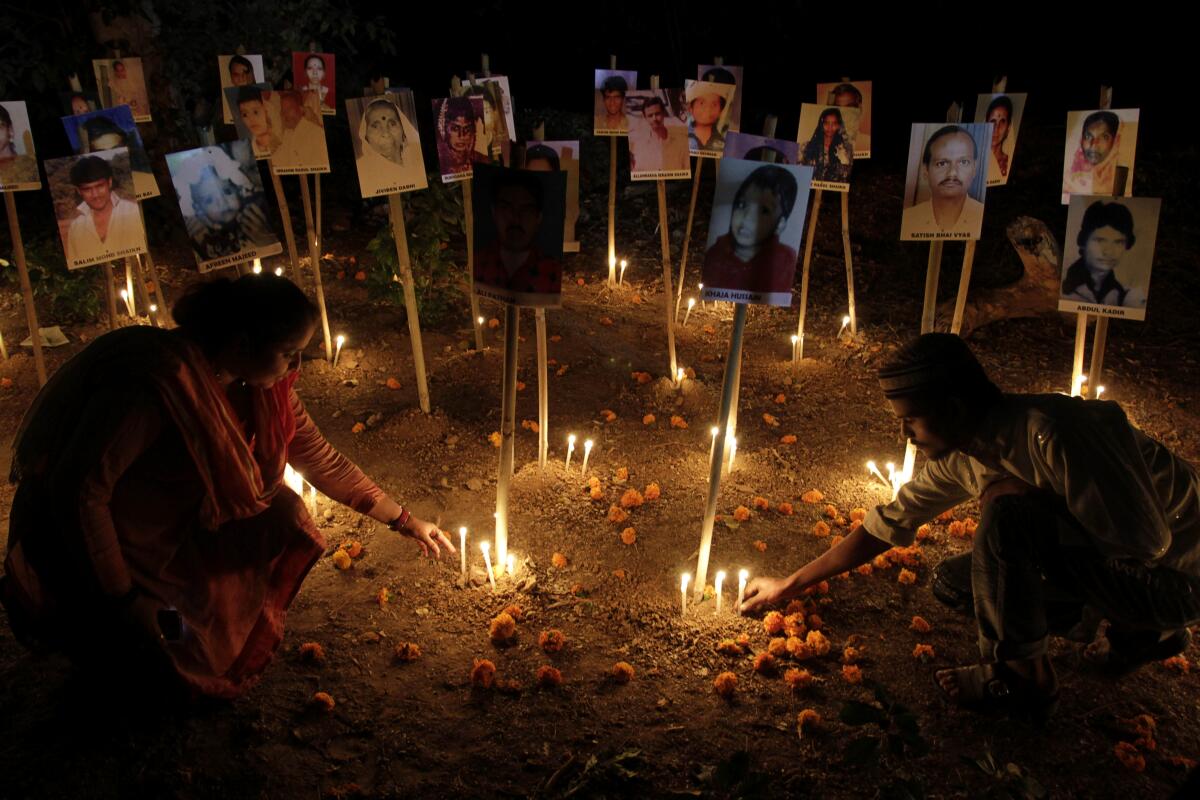
Faruqui, who hails from the city of Junagarh, lost his mother at a young age and moved to Mumbai as a teenager to support his family. His first job was at a utensil shop, where he earned about $1 a day for a 13-hour shift. At the time, he couldn’t speak Hindi or English.
He later found work at a graphic design company, where he discovered he was gifted at coming up with witty one-liners for posters. It was around 2017, when a surge in mobile internet access and the arrival of international streaming platforms like Netflix were driving a boom in Indian stand-up comedy, so he decided to try telling jokes before an audience.
Around that time, he met another aspiring comic, Saad Shaikh, at a show where they were the only Muslims performing. The bearded Shaikh said many Indians didn’t immediately peg Faruqui, whose wispy stubble and baggy T-shirts give him the look of a distracted college student, as a practicing Muslim.
Their difference in appearance may help explain their approaches to comedy: Shaikh said he tends to avoid political humor, whereas Faruqui took more risks with his material.
“It is very easy for a Muslim comedian to be targeted,” Shaikh said.
A popular comedy troupe’s decision to pull clips of a raunchy performance off the Internet has revived an old question in India.
Aditi Mittal, a Mumbai-based stand-up comic, said political comedy has become increasingly fraught under Modi’s government. Since 2014, Mittal said, even joking about rising gas prices earned howls of protest from the prime minister’s partisans.
“You never know what may lead to a controversy, and that is always at the back of my mind when I write jokes,” she said. “But it is our responsibility to speak up.”
Last summer, comedian Agrima Joshua received rape and death threats for telling jokes allegedly insulting Shivaji, the 17th century warrior king revered by Hindu nationalists in Maharashtra state, which includes Mumbai.
Comedian Kunal Kamra is facing contempt charges in India’s Supreme Court for tweets criticizing the court after it granted bail to pro-BJP news anchor Arnab Goswami in a case involving the 2018 deaths of an interior designer and the designer’s mother.
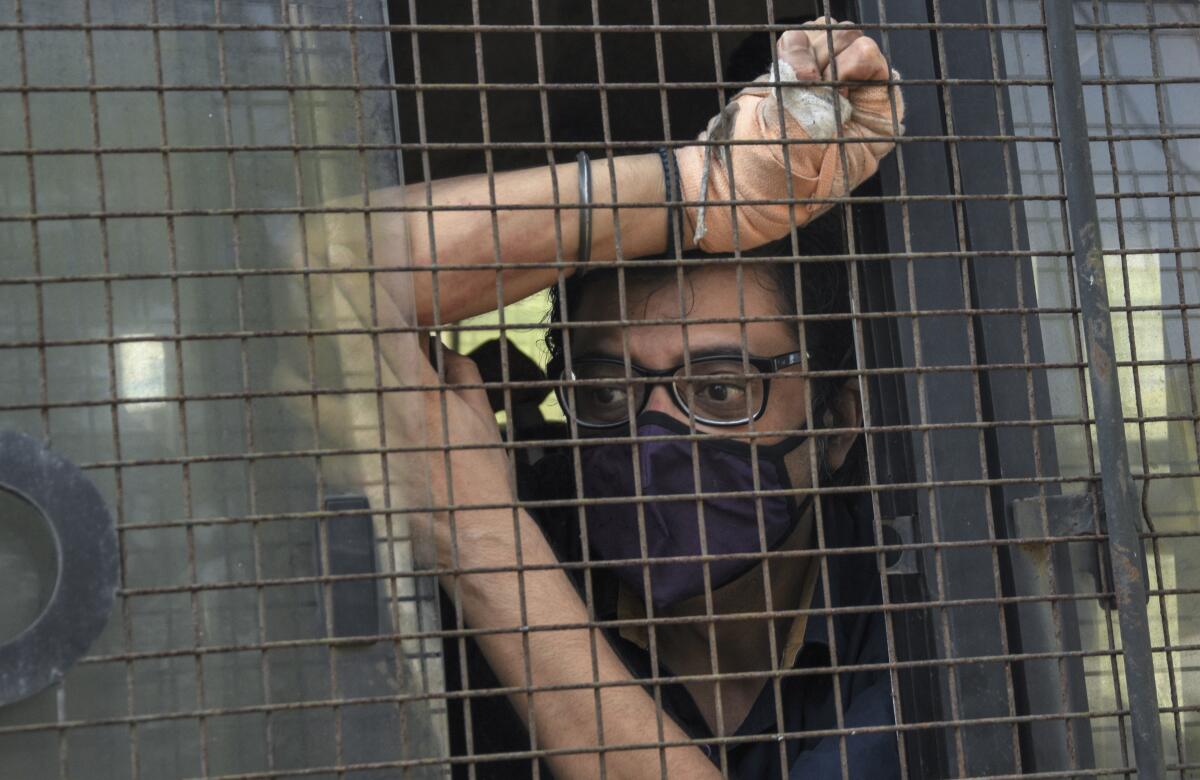
Kamra refused to apologize and issued a passionate statement in which he wrote: “Should powerful people and institutions continue to show an inability to tolerate rebuke or criticism, we would be reduced to a country of incarcerated artists and flourishing lapdogs.”
Sanjay Rajoura, a New Delhi-based member of the Aisi Taisi Democracy satirical troupe, said the case against Faruqui is the sign of a “rotten society,” and would dog him even if he is cleared of wrongdoing.
More stories from Asia
“Who will give him shows?” Rajoura said. “Those who own venues will have a fear of backlash. So will the sponsors. It will have an impact on his career.”
Ashutosh Bagri, the police superintendent in Indore, has pledged a “fair and impartial” investigation. But the court in Madhya Pradesh state sharply criticized Faruqui in a hearing Jan. 25, when a judge accused him of taking “undue advantage of others’ religious sentiments and emotions” in his act.
“What is wrong with your mindset?” the judge asked. “How can you do this for the purpose of your business? Such people must not be spared.”
Shaikh said that in the months before the incident in Indore, Faruqui began to realize that many people in India felt the same way as the judge. Last April, social media trolls threatened him over his jokes about Hinduism. A hashtag calling for his arrest briefly trended nationally.
“That shook him,” Shaikh recalled. “He was even questioning his comedy at the time, but we told him to have faith in the judiciary. Looking back, we were probably wrong.”
Special correspondent Parth M.N. reported from Mumbai and Times staff writer Bengali from Singapore.
More to Read
Sign up for Essential California
The most important California stories and recommendations in your inbox every morning.
You may occasionally receive promotional content from the Los Angeles Times.

